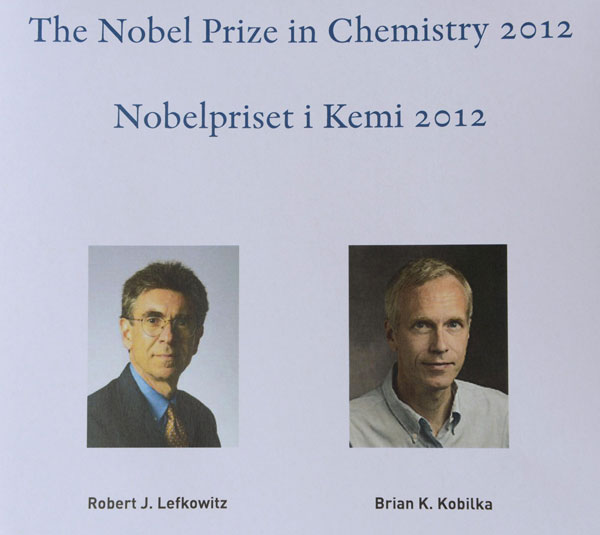2 Americans win Nobel Prize in Chemistry
Updated: 2012-10-10 20:50
(Xinhua)
|
||||||||
STOCKHOLM - Two American scientists Robert J. Lefkowitz and Brian K. Kobilka won the 2012 Nobel Prize in Chemistry, announced Staffan Normark, Permanent Secretary of the Royal Swedish Academy of Sciences in Stockholm on Wednesday.
They were awarded "for groundbreaking discoveries that reveal the inner workings of an important family of such receptors: G-protein-coupled receptors," said the academy in a statement, adding that the studies by Lefkowitz and Kobilka are crucial for understanding how G-protein-coupled receptors function.
 |
|
Scientists Robert Lefkowitz and Brian Kobilka (R) of the US, who won the 2012 Nobel Prize in Chemistry, are seen in this handout image received by Reuters October 10, 2012. [Photo/Agencies] |
About a thousand genes code for such receptors, for example, for light, flavor, odor, adrenalin, dopamine and serotonin and about half of all medications achieve their effect through G-protein-coupled receptors, the statement explained.
Lefkowitz started to use radioactivity in 1968 in order to trace cells' receptors and he unveil several receptors including beta-adrenergic receptor, the one for adrenalin.
In the 1980s, Kobilka and his researchers discovered that the receptor was similar to one in the eye that captures light. Then they realized that there is a whole family of receptors that look alike and function in the same manner.
Kobilka also achieved another break-through in 2011 by capturing an image of the beta-adrenergic receptor at the exact moment that it is activated by a hormone and sends a signal into the cells. This image is a molecular masterpiece-the result of decades of research, it added.
Born in 1943 in New York, Lefkowitz got his master degree from Columbia University in 1966 and is now Professor of Medicine and Biochemistry at Duke University Medical Center in Durham of USA.
Kobilka was born in 1955 in Little Falls MN. USA and got his Master Degree from Yale University in 1981. He is Professor of Medicine and Molecular and Cellular Physiology at Stanford University in CA, USA.
This was the third of this year's crop of Nobel prizes. All but one of the prizes were established in the will of 19th century dynamite millionaire Alfred Nobel. The economics award was created by Sweden's central bank in 1968.
On Tuesday, the Nobel Prize in Physics went to Serge Haroche of France and David Wineland of the US.
A total of 161 laureates have received the Nobel Prize in Chemistry between 1901 and 2011. Among them, four were women and British scientist Frederic Sanger was the only scientist who won twice in chemistry, one in 1958 and one in 1980.
Each prize consists of a medal, a personal diploma and a cash award. This year's prize is 8 million Swedish kronor ( about $1 million).

 Relief reaches isolated village
Relief reaches isolated village
 Rainfall poses new threats to quake-hit region
Rainfall poses new threats to quake-hit region
 Funerals begin for Boston bombing victims
Funerals begin for Boston bombing victims
 Quake takeaway from China's Air Force
Quake takeaway from China's Air Force
 Obama celebrates young inventors at science fair
Obama celebrates young inventors at science fair
 Earth Day marked around the world
Earth Day marked around the world
 Volunteer team helping students find sense of normalcy
Volunteer team helping students find sense of normalcy
 Ethnic groups quick to join rescue efforts
Ethnic groups quick to join rescue efforts
Most Viewed
Editor's Picks

|

|

|

|

|

|
Today's Top News
Health new priority for quake zone
Xi meets US top military officer
Japan's boats driven out of Diaoyu
China mulls online shopping legislation
Bird flu death toll rises to 22
Putin appoints new ambassador to China
Japanese ships blocked from Diaoyu Islands
Inspired by Guan, more Chinese pick up golf
US Weekly

|

|






